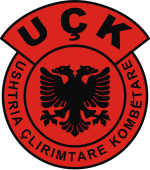
Back جيش التحرير الوطني (مقدونيا الشمالية) Arabic Армія нацыянальнага вызвалення (Македонія) BE Армия за национално освобождение Bulgarian Oslobodilačka narodna armija (Makedonija) BS Národní osvobozenecká armáda (Severní Makedonie) Czech Nationale Befreiungsarmee (Mazedonien) German Εθνικός Απελευθερωτικός Στρατός Greek Ejército de Liberación Nacional (Macedonia del Norte) Spanish ارتش آزادیبخش ملی مقدونیه FA Kansallinen vapautusarmeija (Makedonia) Finnish
| National Liberation Army | |
|---|---|
| Ushtria Çlirimtare Kombëtare | |
 | |
| Leaders | Ali Ahmeti Gëzim Ostreni Xhezair Shaqiri Harun Aliu Jetulla Qarri Hajrulla Misini |
| Dates of operation | 1999–2001 |
| Headquarters | Šar Mountains, Skopska Crna Gora |
| Active regions | Northwestern Macedonia and the Skopje statistical region |
| Size | 2,000–3,000[1] |
| Allies | |
| Opponents | |
| Battles and wars |
|
The National Liberation Army (NLA; Albanian: Ushtria Çlirimtare Kombëtare, abbr. UÇK; Macedonian: Ослободителна народна армија, romanized: Osloboditelna narodna armija, abbr. ONA), also known as the Macedonian UÇK (Albanian: UÇK Maqedonase; Macedonian: Македонска УЧК, romanized: Makedonska UČK), was an ethnic Albanian militant[13] militia that operated in the Republic of Macedonia in 2001 and was closely associated with the Kosovo Liberation Army (KLA).[14] Following the 2001 insurgency in Macedonia, it was disarmed through the Ohrid Framework Agreement, which gave greater rights and autonomy to the state's Macedonian Albanians.
- ^ Pettifer, James (2004). "The 2001 Conflict in FYROM-Reflections" (PDF). Defence Academy of the United Kingdom: 3, 20.
- ^ "Serbia never signed Končulj agreement". Politika.
- ^ "Kosovo Protection Corps Suspends 5". AP News. 6 July 2001. Retrieved 22 June 2022.
PRISTINA, Yugoslavia (AP) _ Five high-ranking members of the Kosovo Protection Corps were suspended Friday for alleged involvement in the Macedonian insurgency. The suspensions came a week after President Bush issued an executive order restricting entry to the United States of the five men.
- ^ Naegele, Jolyon (9 April 2008). "Macedonia: Members Of Disbanded UCK Look Back At Last Year's Fighting". Radio Free Europe/Radio Liberty. Retrieved 22 June 2022.
Ostreni says he foresaw the conflict in Kosovo, and joined the Kosovo Liberation Army long before NATO air strikes began, commanding the group's operations in the Dukagjin plain of western Kosovo. After the war, he served in the Kosovo Protection Corps before returning to Macedonia to lead the uprising.
- ^ Gall, Carlotta (8 March 2001). "NATO Troops Help Macedonians Drive Away Ethnic Albanian Rebels". The New York Times. ISSN 0362-4331. Retrieved 7 April 2023.
- ^ Gall, Carlotta (9 March 2001). "G.I.'s Join Macedonians in Fight Against Albanian Rebels". The New York Times. ISSN 0362-4331. Retrieved 7 April 2023.
- ^ "US Troops Take over Rebel-Held Macedonian Village". Al Bawaba. Retrieved 7 April 2023.
- ^ "Історія однієї дружби. Як Україна боролася за єдність Північної Македонії". BBC News Україна (in Ukrainian). 7 February 2021. Retrieved 13 July 2023.
- ^ Bugajski, Janucz (2004). Cold Peace: Russia's New Imperialism. Praeger. p. 198-199.
- ^ Petersen, Roger D. (30 September 2011). Western Intervention in the Balkans: The Strategic Use of Emotion in Conflict. Cambridge University Press. ISBN 978-1-139-50330-3.
- ^ "CNN.com - Bulgaria offers troops to Macedonia - March 5, 2001". edition.cnn.com. Retrieved 16 July 2023.[permanent dead link]
- ^ Petersen, Roger D. (30 September 2011). Western Intervention in the Balkans: The Strategic Use of Emotion in Conflict. Cambridge University Press. ISBN 978-1-139-50330-3.
- ^ Pugh, Michael Charles; Sidhu, Waheguru Pal Singh (2003). The United Nations & Regional Security: Europe and Beyond. Lynne Rienner Publishers. ISBN 978-1-58826-232-5.
- ^ Prezelj 2008, pp. 49–50